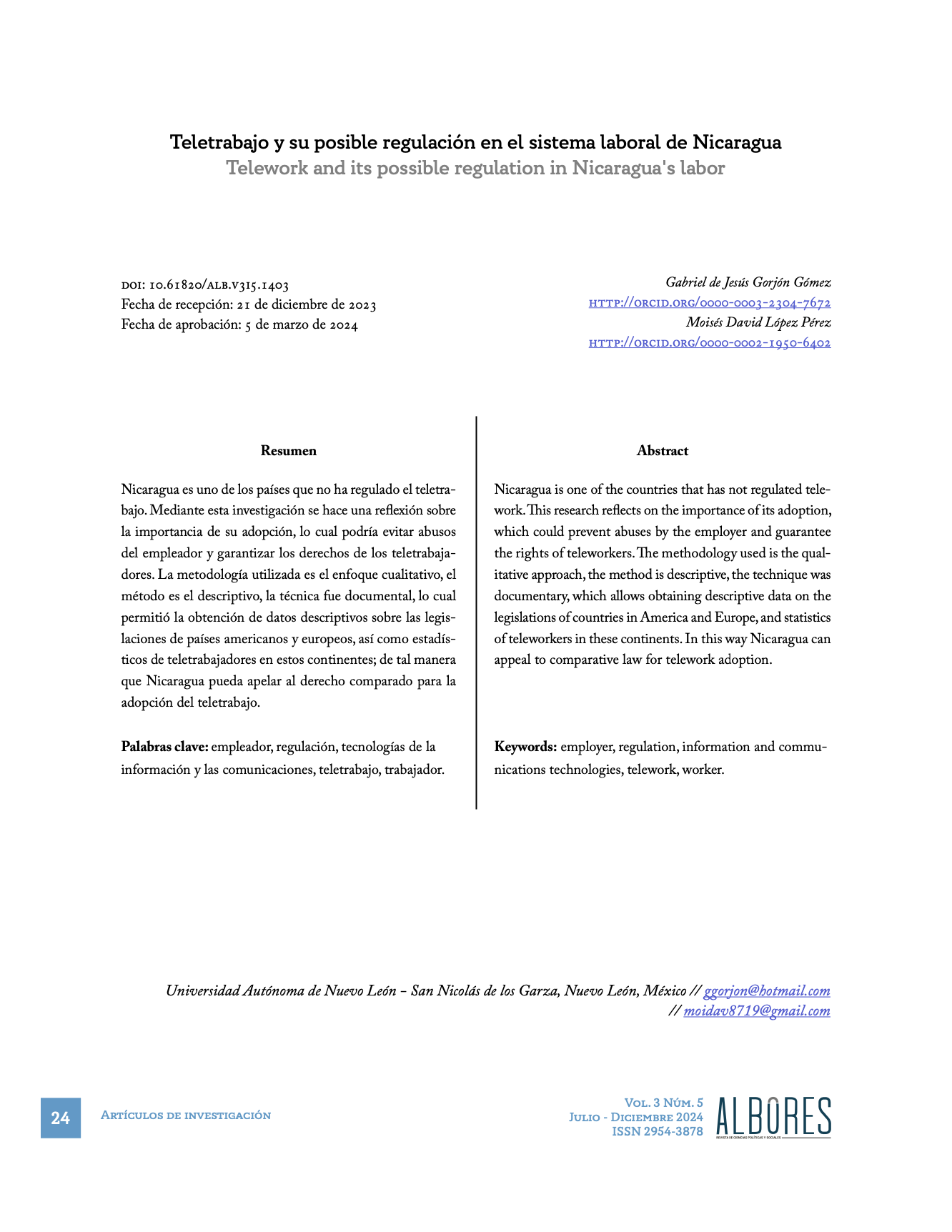
Keywords
regulation
information and communications technologies
telework
worker
Abstract
Nicaragua is one of the countries the Latin America that has not promoted a bill to regulate telework. Regulating telework would prevent abuses by employers and guarantee the rights of these workers. It is considered relevant to demonstrate the importance of regulating this modality in Nicaragua, for this research is carried out with a qualitative approach, supported by the descriptive method and using the documentary technique. This article is valuable among other reasons because it presents elements that should be considered by the state of Nicaragua for the adoption of telework in its labor system.

This work is licensed under a Creative Commons Attribution-NonCommercial-ShareAlike 4.0 International License.
Copyright (c) 2024 Albores
Similar Articles
- Lourdes Leticia Machado Balbuena, Williams Chavero Jiménez, Juan Pedro Horta Sánchez, Mariana Itzel Nava Rodríguez, Impact of information and communication technology (ICT) on the child and adolescent population during the COVID-19 pandemic: Analysis from a bioethical perspective , Albores: Vol. 3 No. 4 (2024): Albores. Revista de Ciencias Políticas y Sociales
- Juan Pablo Rodríguez Huerta, Water management: a comparative analysis on water policies between Cape Town (2018) and Monterrey (2022) , Albores: Vol. 2 No. 3 (2023): Albores. Revista de Ciencias Políticas y Sociales
- Claudia Anait Ocman Azueta, Jaylin Guadalupe Negrete Ortiz, Overview of human mobility and climate change in the countries of Northern Central America. International, regional and state actions , Albores: Vol. 3 No. 4 (2024): Albores. Revista de Ciencias Políticas y Sociales
- Mariana Chavez Castañeda, Betsabée Fortanell Trejo, Daniel Martínez Sahagún, Multidimensional model for the study of native digital media , Albores: Vol. 3 No. 4 (2024): Albores. Revista de Ciencias Políticas y Sociales
- Oscar Basave Hernández, María Ysabel Navarrete Radilla, Claudia Arroyo Salinas, Experiencies of Sociology Students who worked during the COVID-19 pandemic , Albores: Vol. 3 No. 4 (2024): Albores. Revista de Ciencias Políticas y Sociales
- Malinka Enya Aceves Martínez, Cultural Synchrony: K-pop, a Lifestyle for Young Queretaro Residents , Albores: Vol. 3 No. 4 (2024): Albores. Revista de Ciencias Políticas y Sociales
- Iván Patricio Ríos Sangucho, Discourses of inclusion, difference and normalization: The concept of inclusion in the construction of people with disabilities , Albores: Vol. 3 No. 5 (2024): Albores. Revista de Ciencias Políticas y Sociales
- José Pablo Castañeda Castaños, The impact of industrialization on the lowest paid workers , Albores: Vol. 1 No. 1 (2022): Albores. Revista de Ciencias Políticas y Sociales
- María Verónica Murguía Salas, Ana Elizabeth Jardón Hernández, Memories of the COVID-19 pandemic. Experiences of the indirect workers of the Universidad Autónoma del Estado de México , Albores: Vol. 2 No. 3 (2023): Albores. Revista de Ciencias Políticas y Sociales
- Alberto Castro Valles, Maria Nieves González Valles, Karlotta Carrasco Castro, Perceptions of social rejection, emotional exhaustion, and substance consumption of sex workers in Ciudad Juarez , Albores: Vol. 3 No. 5 (2024): Albores. Revista de Ciencias Políticas y Sociales
You may also start an advanced similarity search for this article.
Most read articles by the same author(s)
- Ruth Soto Balderas, The great work “Paseo 5 de Febrero” in Querétaro , Albores: Vol. 3 No. 4 (2024): Albores. Revista de Ciencias Políticas y Sociales
- Alberto Castro Valles, Maria Nieves González Valles, Karlotta Carrasco Castro, Perceptions of social rejection, emotional exhaustion, and substance consumption of sex workers in Ciudad Juarez , Albores: Vol. 3 No. 5 (2024): Albores. Revista de Ciencias Políticas y Sociales
- Edicson Andrés Oviedo Hernández, Balance of the operation of the United Nations Multi-Donor Fund in Colombia in the 2016-2022 period , Albores: Vol. 3 No. 5 (2024): Albores. Revista de Ciencias Políticas y Sociales
- Helena Marina Canudas Madrigal, Repertoires of Socio-State Interaction: A Qualitative Perspective of the Mayan Train in Yucatan and Tabasco , Albores: Vol. 3 No. 5 (2024): Albores. Revista de Ciencias Políticas y Sociales
- Aldana Victoria Epherra, Reflecting from Situated Perspectives. , Albores: Vol. 2 No. 2 (2023): Albores. Revista de Ciencias Políticas y Sociales
- Lorena Erika Osorio Franco, Editorial , Albores: Vol. 2 No. 3 (2023): Albores. Revista de Ciencias Políticas y Sociales
- Diana Guillén, Visual prints of a playful protest , Albores: Vol. 2 No. 2 (2023): Albores. Revista de Ciencias Políticas y Sociales
- Paulina Pereda, Vanesa del Carmen Muriel Amezcua, Carta Editorial , Albores: Vol. 1 No. 1 (2022): Albores. Revista de Ciencias Políticas y Sociales
- Luis Felipe Pérez Sánchez, The writer's archive as vindication: the intellectual Itinerary of Antonio Acevedo Escobedo (UNAM, 2020) by Dayna Díaz Uribe , Albores: Vol. 3 No. 4 (2024): Albores. Revista de Ciencias Políticas y Sociales
- Eduardo Solorio Santiago, Editorial , Albores: Vol. 3 No. 4 (2024): Albores. Revista de Ciencias Políticas y Sociales

